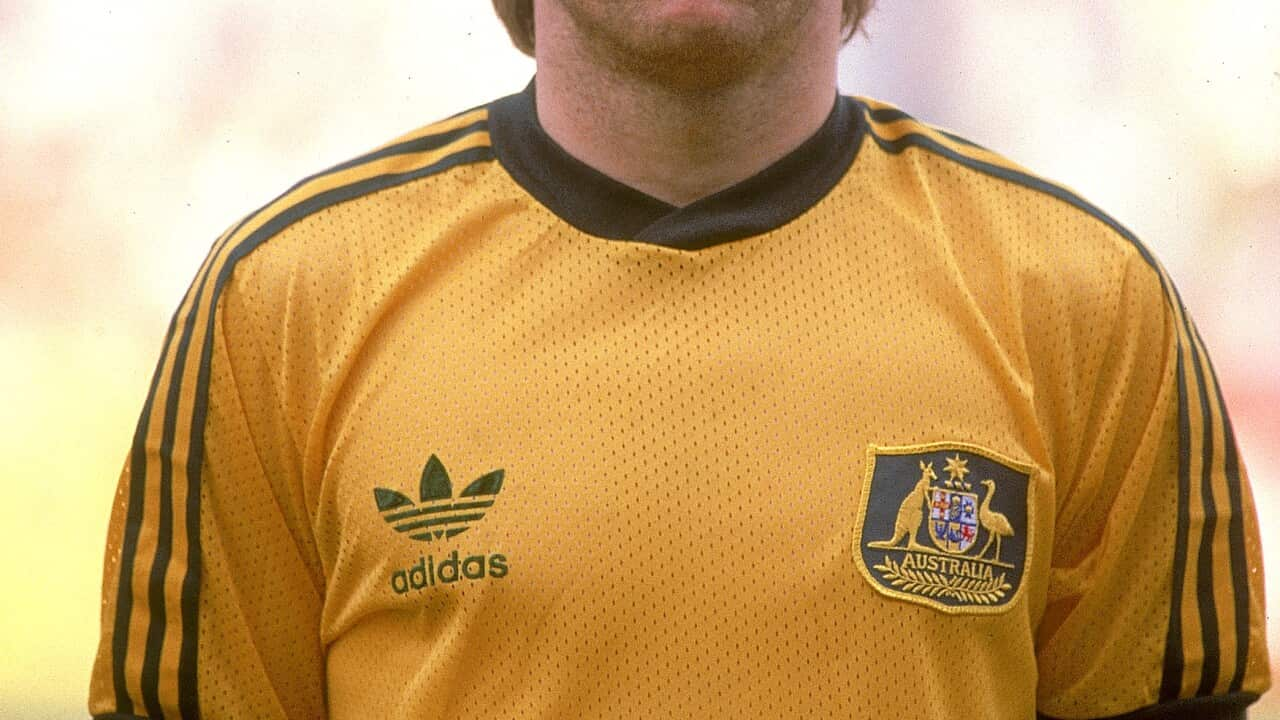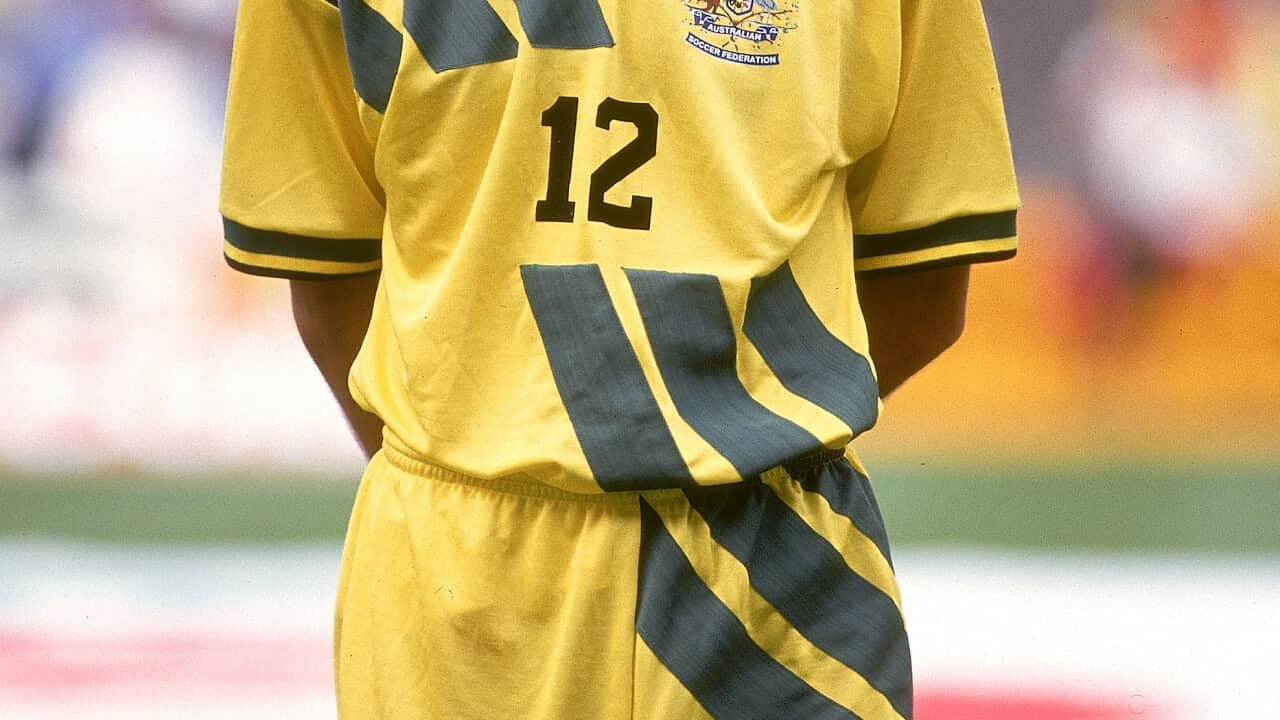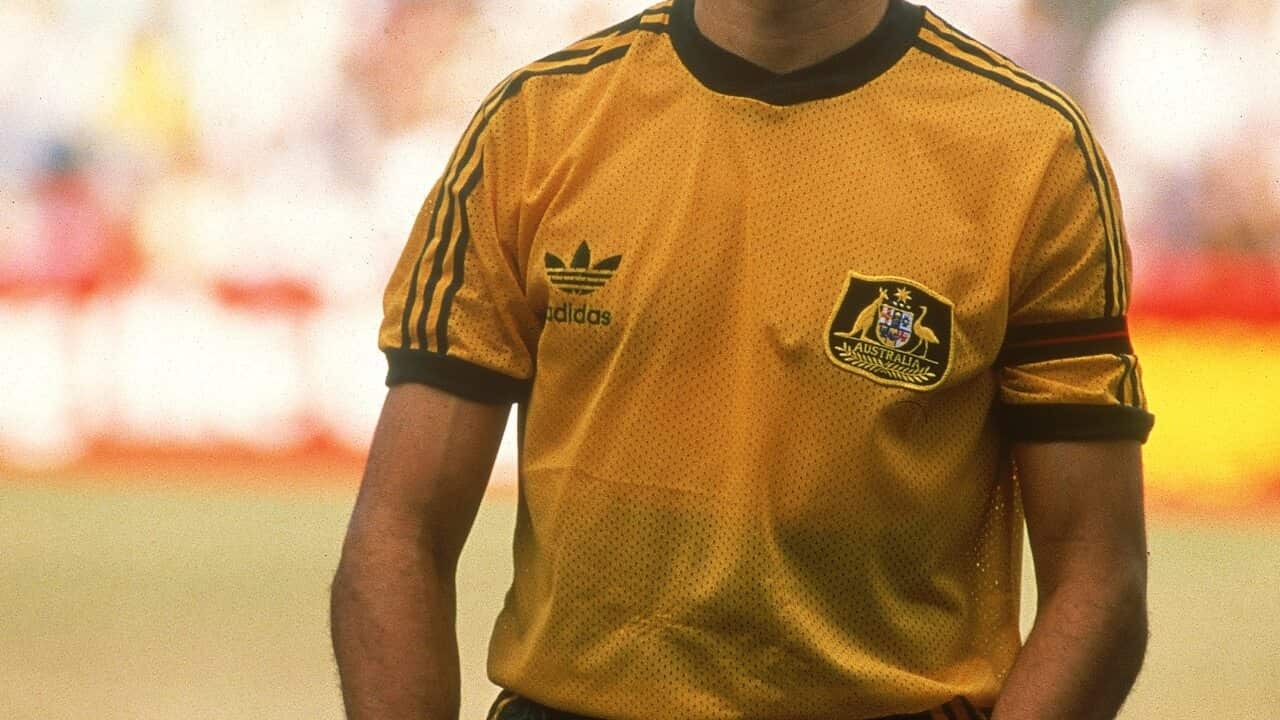Some players are born with a natural ability and some others with leadership qualities. Midfielder Paul Wade had 'Socceroos captain' written all over him from the first time he kicked a ball in anger.
Cheshire-born Wade was never going to be a star with the silky skills that mesmerise opponents but his competitive character and esprit de corps made him a favourite with any coach who had the privilege of working with him.
Wade, who is now 54, made 84 appearances for the Socceroos - half of them as captain - and will go down as one of the fiercest and most loyal competitors in the green and gold jersey.
He played all his club football in Australia, mostly for South Melbourne in the National Soccer League.
"I don't want to use the cliche '110 per cent' but I was given the job as Socceroos skipper because I could motivate people," he said.
"That's what (late Socceroos coach) Eddie Thomson said. And the only way I could motivate them was by being reliable and consistent.
"These were the only two things I had. I was always going to be there to give everything I got.
"That was what I had. I could not play and I could not score goals but I was consistently going to be around and effective in midfield."
Wade, who lives in Sydney, was more than happy to share his views on football with The World Game.
So what is Paul Wade the former Socceroos captain doing these days?
"It's all honest. I actually earn a living out of football. I coach people to coach kids, I use football and health stories to talk to kids who are in trouble or at risk or who are disadvantaged and try to put their lives in perspective.
"I do a bit of ABC radio and television which basically keeps the wolf from the door."
Do you miss playing football?
"Not one bit. I cannot play anymore, anyway. I'm just about to have my ankle fused. I've had a hip replacement and I've got a steel plate in my head after part of my brain was removed.
"When I decided to retire after a Socceroos game in Canberra in 1996 I was never likely to kick a ball again. I had given everything to the game and there was absolutely no petrol left in the tank.
"Which is a great thing because I love commenting and analysing football but I just cannot be bothered trying to run around and recreate all the great things we used to do."
How much do you follow the game nowadays?
"I work for the ABC and call the Western Sydney Wanderers and Sydney FC home games so I have a keen interest in the A-League. I would not say I dot the i's and cross the t's but I'm really into the intricate details of the game.
"I'm also a Liverpool supporter, a patient Liverpool supporter. We just got beaten in the UEFA Europa League final, which was another tragedy but I grew up with the Liverpool sides of the 1970s and 1980s when everybody else was going to run second."
How do you rate the modern game in Australia?
"I think what Ange Postecoglou is doing with the Socceroos is a breath of fresh air. I played with him at South Melbourne. He never went around raving and ranting. He was always a great thinker of the game. He led by example. Later he won titles for South Melbourne as a coach. Now he has brought a new dimension to our game that we could only have dreamed of in my playing days.
"We used to admire the Spanish play but now we are expected to do the same thing. In my days the players used to say 'don't expect too much' but, guess what, today we do expect because Ange has set high standards.
"Players are willing to make the sacrifice of playing for the national team even though they know they are risking their club positions by being away. For me it is most pleasing to see that players are willing to put they careers on the line to play for their country."
Did you ever imagine that Postecoglou would become coach of Australia?
"Absolutely not. He played as a fullback and he would organise his own area of the pitch and he was a laugh in the dressing rooms.
"But if you had told me he would actually take control of a whole team for 90 minutes and then become coach of the Socceroos, who are the pinnacle of the game in this country, I would have put a straitjacket on you, locked you up and thrown away the key.
"I could not be happier to see a bloke do what he's doing now and everybody agreeing with him."
What did you think of Australia's performance in the 2-1 defeat against England?
"It was another example of how far the Socceroos have come. When we played them in the early 1980s we lost 1-0 through an unlucky own goal from Ian Gray.
"But when it came to playing football we always tried but found it difficult to piece together periods of great play that make people go 'wow'.
"We saw flashes of this from our team against a strong England side that is preparing for EURO 2016. The game in Sunderland was another massive tick in the development of our national team."
Which are the international matches that will stick in your memory for ever?
"Playing against Argentina and Diego Maradona in 1993 for a place in the following year's FIFA World Cup was special.
"People criticised Thomson for playing the first leg in Sydney because it is seen as an advantage to play the return of any tie at home.
"I thought it was a terrific idea to play first at home because Argentina did not quite know what to expect from us and in a way we surprised them with the help of the crowd.
"We got a 1-1 draw but the lead-up to that game was all about Maradona and I had the job of marking him.
"Five hundred million people watched the game on television and I don't think we disgraced ourselves.
"In Buenos Aires a week later little kids were sticking their middle finger at us players on the bus to the stadium.
"They knew the team was under pressure. The Argentine president was saying there would be a day of mourning 'if Australia beat us'. I thought wow, that's pressure. In the end we lost 1-0 through a fluke goal."
What was Maradona like during those two matches?
"Look, I knocked him over in the first five or 10 minutes in Sydney and I apologised. I thought this was the greatest player to ever play the game. I put my hand up to say sorry and he looked at me, put both his hands up and showed his two palms as if to say 'no worries, mate, no big deal, I've had worse than that'.
"From that moment on there was a little bit of respect. He never said anything to me in English. He did not shout or scream, it was all hand signals pointing to where he wanted the ball.
"When he did get it I only saw his left foot because I never got to see the ball. He shielded it so well. I remember saying to myself I was lucky not to be playing against the 1986 Maradona."
You gave everything in football. Do you have any regrets?
"The easy answer is there was no money around when we played. I was a mechanical draftsman and I worked eight hours a day for five days a week.
"I remember one occasion I asked my boss on Wednesday if I could have Friday off because we were playing Brazil on Sunday.
"But if the effort, discipline and expertise we all put in were reflected in our bank balances, it would have been the cherry on the top.
"Yet, you know what, I was probably fortunate to have been born in an era when hard work was a really important part of the game.
"I was lucky in a way to have played then because if I were playing today I would not get a game at all with the style of football that I had.
"So, yes, I have some regrets in terms of remuneration but those days the game needed hardworking people and I just happened to fit that category."
You were a member of two failed World Cup campaigns. Now that Australia has set certain standards of achievement, do you reckon history will treat your generation rather unkindly?
"We will always be in the shadow of the successful sides and I really cannot disagree with that. We tried but every Socceroos side will try. It's all about qualifying.
"The teams of 1974, 2006, 2010 and 2014 did it. We didn't so we won't be remembered so well. I have no problem with that."
Who was your best coach?
"For me personally, it was South Melbourne's Len McKendry. His philosophy was when we got the ball we played it forward. If we could not do it with the first pass, then it had to be with the second. And the speed he wanted the game to be played you had to be super fit. In 1986 I became a very positive midfielder with the kind of engines I never thought I had and I also earned a Socceroos shirt for a decade."
Who were the best players you have played with and against?
"Paul Trimboli is the greatest player I've ever played with, an absolute genius. I would pay money to watch him train, never mind play.
"They have a saying in football that when a ball is played at you you've got to kill it. Well, I've seen Paul control a ball in such a way that you knew that he knew where his second touch would be before he even took the first. He had great vision but he did not play hardly enough games for Australia.
"I was given a footballing lesson by Maradona in 1993 even though he did not score in either leg but he made me realise the technical gap between the NSL and the rest of the world.
"Also, I remember when Mark Viduka first played for Melbourne Croatia. I was given the job of marking him. I said 'yeah, big boy but he's young'. Well, I never saw the ball because he tore me apart. He made me feel inefficient and realise he was something special."
Who are the players you admire most at home and abroad?
"Aaron Mooy is as good as Trimboli. No matter how close you get to him he never gives the ball away. I have questioned his work rate in the past but I have to say I've watched him closely recently and you cannot fail him on that. He is the perfect package. Not sure about his speed but he's got everything else.
"Overseas I admire Lionel Messi, not only for his incredible skills but for the fact that he always tries to stay on his feet despite being kicked from pillar to post. Other players would not think twice about diving to win multi-million dollar penalties but the Argentine won't do that."
You have been suffering from epilepsy for several years. Tell us about the on-air incident in 2001 while you were working with Channel 7.
"I knew I had epilepsy because I collapsed before we played Argentina. I was dragged to a neurologist who gave me medication. I walked around as a footballer and a commentator hoping nobody would see me having a seizure.
"I got away with it and then I got caught on Seven while talking to Paul Okon after the Australia match with France at the MCG. I asked him the first question which was fine, then I asked him the second and my voice became distorted.
"After my second question I did not give him the microphone while he was answering. I did not know I was having a seizure, Paul did not know it either and he asked me if I was taking the mickey.
"Boy, when I look back at the video ... it was embarrassing. That was the first time anybody knew about it outside my immediate family.
"I did not lose my job on television but I had to have brain surgery because I was having five seizures a day. Unfortunately the wound got infected and I needed a second operation to take my skull out and a third to put a steel plate in over the skull. So all up I had three major operations in six months.
"The only things missing are my short-term memory and ability to concentrate.
"But I tell you what, the memory loss allows me to hide my own Easter eggs."
PAUL WADE FACTFILE
Club career:
1984: Green Gully
1985-1986: Brunswick Juventus
1987-1995: South Melbourne
1995: Heidelberg
1995-1997: Canberra Cosmos
International career:
1986-1996: Australia 84 matches
Honours:
South Melbourne: National Soccer League 1990-1991, NSL Cup 1989-1990. Brunswick Juventus: NSL 1985. Australia: OFC Nations Cup 1996.





